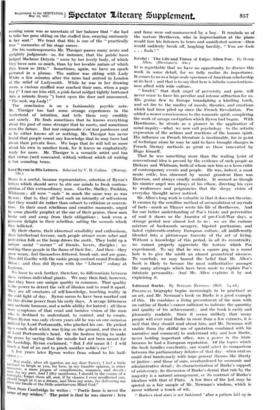Lord Byron in His Letters. Selected by V. H. Collins.
(Murray. 12s.) HERS is a useful, because representative, selection of Byron's letters which should serve to stir our minds to fresh contem- plation of thiS extraordinary man. Goethe, Shelley, Pushkin, Whitman ; all were " cads " in much the same way as was Byron ; that is, they all had such an intensity of self-esteem that they would die rather than submit to criticism or conven- tion. In their most rebellious and creative moments, urged by some ghostly prophet at the ear of their genius, these men broke out and away from their obligations ; took even a perverse delight in their rebellion, salting the wounds which they inflicted.
By their charm, their abnormal sensibility and enthusiasm, their intellectual fervour, such people attract more sober and pedestrian folk as the lamp draws the moth. They build up a unique social " corner " of friends, lovers, disciples ; re- making these people in the flame of their fire. And then—they grow weary, feel themselves fettered, break out, and are gone. Thus did Goethe with the rustic group centred round Frederike Brion ; and thus did Byron with the " Liberal " colony at Leghorn.
We have to seek further, therefore, to differentiate between these various individual giants. We may then find, however, that they have one unique quality in common. That quality is the power to detect the veil of illusion and to rend it apart. They are all creatures of self-knowledge, touching reality in the cold light of day. Byron seems to have been marked out for this divine power from his early days. A savage bitterness and sardonic humour, and a noble ability for hatred ; all these Were symptoms of that cruel and incisive vision of the man Who is destined to understand, to control, and to create. hen Byron was only eleven years old he was on one occasion noticed by Lord Portsmouth, who pinched his ear. He picked lip a conch shell which was lying on the ground, and threw it at Lord Portsmouth's head. On the hostess trying to make the peace by saying that the missile had not been meant for his Lordship, Byron exclaimed, " But I did mean it ! I will teach a fool of an earl to pinch another noble's ear ! "
A few years later Byron writes from school to his half- sister :— "..But really, after all (pardon me my dear Sister), I feel a little
"lined to laugh at you, for love, in my humble opinion, is utter nonsense, li
a mere jargon of compliments, romance, and deceit ;
nos-, for my part, had I fifty mistresses, I should in the course of a fortnight, forget them all, and, if by chance I ever recollected one, thould laugh at it as a dream, and bless my stars, for delivering me from the hands of the little misehievoue Blind God."
Then from Cambridge he writes : " Poetic fame is never the ate' of-my wishes." The point is that he was sincere : love
and fame were out-manoeuvred by a boy. It reminds us of the mature Beethoven, who in improvisation at the piano would lure his listeners to tears and manifested sorrow—then would suddenly break off, laughing harshly, " You are fools . . . fools ! "


























































 Previous page
Previous page